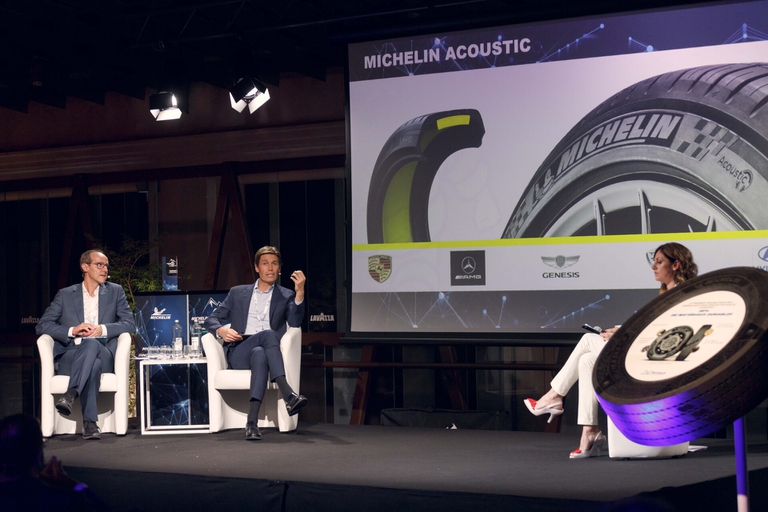https://www.lifegate.it/michelin-festeggia-i-suoi-primi-60-anni-a-cuneo
- |
The celebrations take place in Turin, the city that has hosted the first headquarters of the Michelin Italian and where, even today, in addition to the registered office, some production and logistics activities remain.But the opportunity is there 60th anniversary celebration since the opening of the factory Wedge, a true European nerve center for the production, research and development of tyres.Here, in fact, in what is considered one of Michelin's 8 centers of excellence distributed in Europe as well as a strategic technological hub, new technologies are tested and developed, before large-scale industrialization in other production centers in the world.
Sixty years of innovation, where gender equality and renewables have often been at the center of the French group's sustainability.Years, those that characterized the history of the Cuneo site, "tackled by focusing on the competitiveness of the factories, with a strategic vision permeated by the values of environmental, social and economic sustainability”, he underlined Simone Miatton, president and CEO of Michelin Italia.“Years”, continued Miatton, “marked by important investments in terms of developing people's skills and industrial processes.Between 2018 and 2022 alone the group invested around 315 million euros in Italy."

From energy efficiency to gender equality
Sixty years that have seen Michelin's commitment to sustainability grow, not an easy challenge for a tire manufacturer.The event was an opportunity to retrace the stages of the "All Sustainable" strategy, developed through its three axes:People, Planet and Profit.From the importance that the well-being of its employees has always had for Michelin, confirmed by obtaining the certification in 2022 gender equality promoted by the Winning women institute (Michelin Italiana is among the most virtuous companies on gender equality), to build an inclusive work environment.
From the objectives of energy efficiency of production sites in Italy, to the supply of energy from certified renewable sources, to the challenging objectives of reducing emissions, in production processes, in products, but also thanks to the establishment of actions such as the certificate of sustainable management of tires which sees the involvement of road transport fleets.In short, Michelin's commitment is concrete.
Michelin:carbon neutrality by 2050
Michelin's objective, also reiterated in Turin, remains that of reducing emissions by 50 percent in 2030 (compared to 2010 values), in line with the group's objectives which envisage achieving carbon neutrality by 2050, focusing increasingly on the circular economy for the management of factory waste, reducing CO2 emissions, but also the use of raw materials necessary for the production of tyres.A process that will go from "premium products, team excellence, modernization of the production process, improvement of working conditions and guarantee of efficient use of resources and social dialogue", as explained during the event Simone Rossi, director of the Cuneo plant, all aspects thanks to which "we will be able to continue building the future of the Cuneo plant".

What do tires have to do with climate change
A future that, in terms of research and development, will have to face demanding challenges.There electric transition of the car in fact, it brings with it a series of aspects that closely affect all tire manufacturers:from the reduction of rolling resistance (less friction means more efficiency) and del noise, until the tightening expected with the introduction of Euro 7 on fine dust that tires and brakes emit during the use of a car, electric or otherwise.
From the characteristics (more intense acceleration and braking) of electric cars, to the need to adapt the characteristics of the tires to sudden changes climate changes, which require compounds capable of adapting to extremely changeable temperatures and road conditions.Until disposal at the end of life and the increase in recycled or renewable materials, such as silica obtained from rice husk or recycled steel.Along this line, Michelin will market a new tire suitable for cars and public transport in 2025, with percentages of up to 58 percent recycled materials or from renewable sources.All aspects in which the Michelin plant in Cuneo will be able to make an important contribution.

Michelin and its commitment to local businesses
But tire production isn't everything.In fact, the Michelin plant in Cuneo also hosts the CIM 4.0 hub in Turin, a laboratory dedicated to innovation designed to support local businesses, with the involvement of local communities on issues such as road safety with the city's schools, sporting events, interaction with the university.The objective of the laboratory is also to provide support to manufacturing companies in the area thanks to the diffusion of the digitalisation of industrial processes through a series of topics ranging from autonomous driving systems to machine learning, up to robots for industrial applications.
